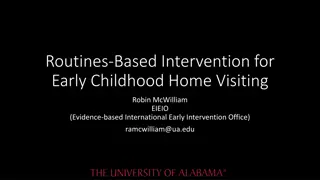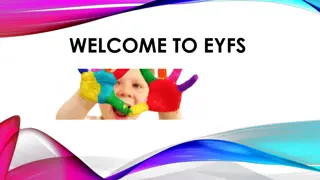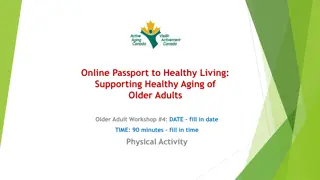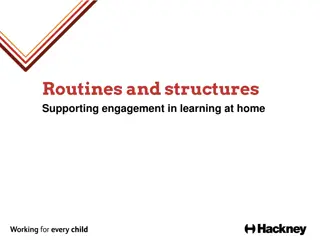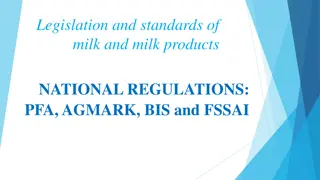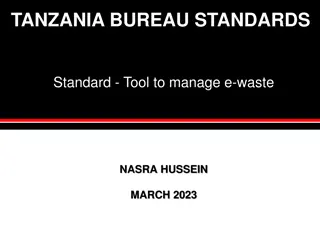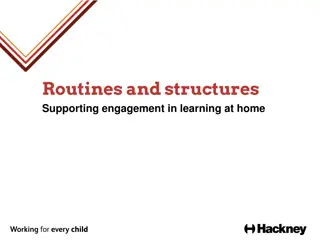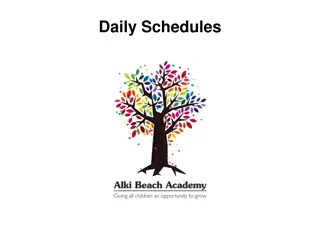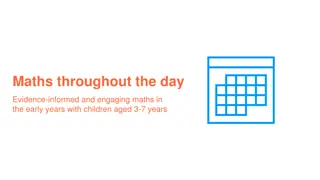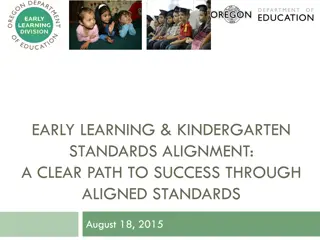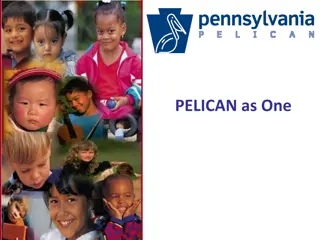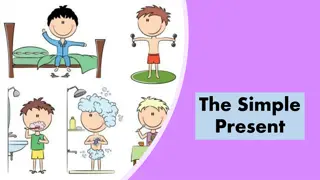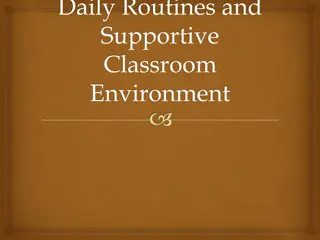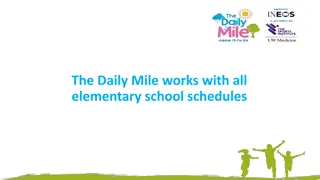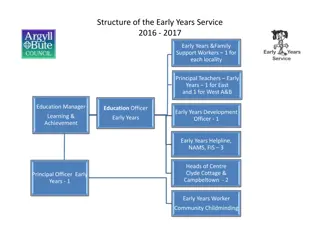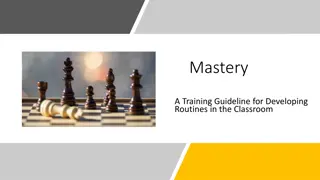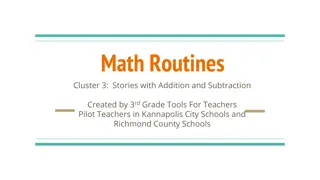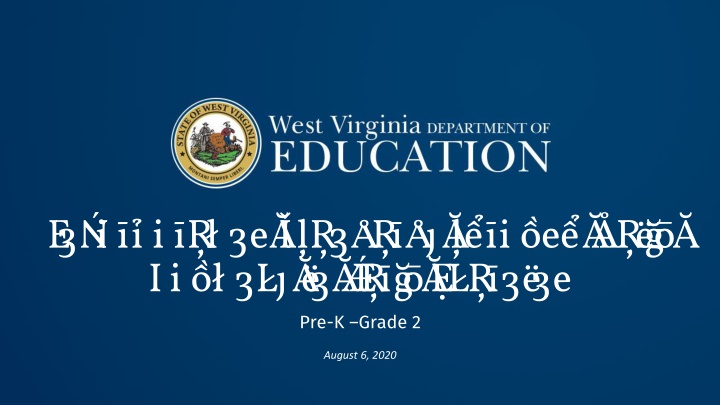
Incorporating Standards in Early Learning Routines for Pre-K to Grade 2
Explore the importance of integrating standards into daily routines for early learning, focusing on examining learning targets, math, language arts, science, social-emotional development, and more. Understand why incorporating standards throughout the day is crucial and how to do so effectively by connecting content areas, decreasing transitions, and utilizing formative assessment.
Download Presentation

Please find below an Image/Link to download the presentation.
The content on the website is provided AS IS for your information and personal use only. It may not be sold, licensed, or shared on other websites without obtaining consent from the author. If you encounter any issues during the download, it is possible that the publisher has removed the file from their server.
You are allowed to download the files provided on this website for personal or commercial use, subject to the condition that they are used lawfully. All files are the property of their respective owners.
The content on the website is provided AS IS for your information and personal use only. It may not be sold, licensed, or shared on other websites without obtaining consent from the author.
E N D
Presentation Transcript
I nc o rp o ra ti ng Sta nda rds thro ugh Da i l y Ro uti nes i n E a rl y Lea rni ng Pre-K Grade 2 August 6, 2020
Lea rni ng Ta rgets Examine standards that teachers must incorporate in children s learning throughout the day. Explore blending activities to ensure appropriate and applicable instructional supports that scaffold children s learning over time. Analyze assessing children s growth through an integrated approach to learning. 2
Mathematics Mathematics Assuring Quality of Education: Regulations for Education Programs (2510) Assuring Quality of Education: Regulations for Education Programs (2510) English Language Arts English Language Arts Dispositions and Standards for Student Success (K-12) Approaches to Learning Science Science K-2 Pre-K West Virginia's Universal Access to a Quality Early Education System (2525) Social & Emotional Development Technology & Computer Science Social Studies (K-12) Health and Physical Development Wellness Education (K- 12) The Arts The Arts 3
W hy do we need to i nc o rp o ra te sta nda rds thro ugho ut da i l y ro uti nes? There are a lot of standards to address. An integrated approach increases children s understanding of concepts and ability to assimilate information and skills to other areas. All parts of the day should be designed as learning experiences that are hands-on and relevant. 4
Ho w do we i nc o rp o ra te sta nda rds thro ugho ut da i l y ro uti nes? Examine your current routine: Do you spend a lot of time in transitions? Are there times in the routine where you feel learning is not occurring? What standards are left behind due to the current schedule? 5
Ho w do we i nc o rp o ra te sta nda rds thro ugho ut da i l y ro uti nes? Connect content areas Decrease transitions Small Groups Formative Assessment 6
Ho w do we i nc o rp o ra te sta nda rds thro ugho ut da i l y ro uti nes? Explore, discover, and solve problems through simple, everyday elements. T.K-2.11. With support and guidance, select appropriate technology tools to solve problems and communicate information. T.K-2.12. With support and guidance, create a product using a step-by-step process through the use of age- appropriate digital and non-digital resources. DSS.K-2.4. Decision Making and Personal Responsibility Set goals, develop a plan, and follow it through to completion. Developing Classroom Rules-kindergarten example Discuss what rules are and why they are necessary for the class. DSS.K-2.13. Careers and Life Success Identify and begin using expected dispositions, skills, and behaviors in school and community (e.g., attendance, punctuality, communication, relationships, attitudes, perseverance, collaboration, critical thinking and leadership). Brainstorm potential rules of children and reasons for those rules. Include essential rules or prompts for children to express rules in their words. ELA.K.30. Participate in collaborative conversations with diverse partners about kindergarten topics and texts with peers and adults in small and larger groups. Follow agreed-upon rules for discussions. Continue a conversation through multiple exchanges. Develop a manageable list of priority rules for classroom adoption based on children s input. SS.K.3. Investigate the need for rules in their environment, create a set of classroom rules, and explore the consequences for not following the rules. Have children draw or take pictures of behaviors to represent each rule to be included with the list. 7
F o rm a ti ve Assessm ent 9
Ho w do we sup p o rt l ea rni ng rem o tel y thro ugh da i l y ro uti nes a t ho m e? Explore, discover, and solve problems through simple, everyday elements. Activity/Standard Skills/Behaviors Parent comments Mathematics Make a snack or meal for the family. Have your child: 1. Count food for each person. 2. Read a recipe. 3. Measuring ingredients. 4. Talk about sharing and equal amounts. 5. Set a place at the table for each family member. 6. Discuss food groups. 7. Discuss changes in food while cooking. Dispositions and Standards for Student Success English Language Arts Content Standards Social Studies & Social and Emotional Development Science Parent Observations: Technology & Computer Science The Arts Wellness Education & Physical Health and Development 10
Reso urc es: WVBE Policy 2510 Guidance: https://wvde.us/early-and- elementary-learning/wvbe-policy-2510-guidance/ WVBE State Board Policies (including Content Standards): http://wvde.state.wv.us/policies/ 11
Tha nk yo u f o r p a rti c i p a ti ng! Contact Information: Janet Bock-Hager, Coordinator, WVDE Office of Early & Elementary Learning E-mail: jbockhager@k12.wv.us 12
Sessi o n E va l ua ti o n Participants only get credit for attending through completion of the session evaluations. Pease complete the evaluation by the end of the day. Instructional Support Professional Learning Forum Session Survey/Evaluation 13


